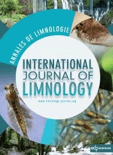
ANNALES DE LIMNOLOGIE-INTERNATIONAL JOURNAL OF LIMNOLOGY
Scope & Guideline
Bridging Theory and Practice in Freshwater Science
Introduction
Aims and Scopes
- Freshwater Ecology and Biodiversity:
The journal publishes studies that investigate the diversity and ecological interactions of freshwater organisms, including fish, invertebrates, and phytoplankton, often focusing on their roles within aquatic ecosystems. - Impact of Pollution and Environmental Stressors:
Research on the effects of pollutants, such as pesticides and heavy metals, on aquatic life forms is a key area, with studies employing histopathological and biochemical analyses to assess the impacts on health and survival. - Hydrology and Water Quality:
The journal covers research on hydrological processes, water quality assessments, and the dynamics of freshwater bodies, emphasizing the importance of these factors in shaping aquatic ecosystems. - Conservation and Management Strategies:
Contributions that provide insights into the management and conservation of freshwater resources, including species recovery efforts and the ecological status of various habitats, are a significant aspect of the journal's scope. - Functional Ecology and Ecosystem Dynamics:
The journal highlights research on functional traits of aquatic organisms and their ecological roles, including studies on food webs and community dynamics in response to environmental changes.
Trending and Emerging
- Effects of Climate Change on Freshwater Systems:
Research examining how climate change influences freshwater ecosystems is increasingly prominent, including studies on temperature variations, altered hydrological cycles, and their effects on aquatic biodiversity. - Ecotoxicology and Chemical Exposure Studies:
There is a growing emphasis on the impacts of chemical pollutants, such as neonicotinoids and triclosan, on aquatic organisms, showcasing a trend towards ecotoxicological research that assesses both sub-lethal and lethal effects. - Functional Trait Analysis and Community Dynamics:
Emerging studies focus on the functional traits of aquatic organisms and their implications for community structure and ecosystem functioning, reflecting a shift towards understanding ecological roles rather than solely species identities. - Urban and Anthropogenic Influences on Freshwater Habitats:
Research exploring the impacts of urbanization and anthropogenic activities on freshwater ecosystems is on the rise, addressing issues such as habitat degradation and the introduction of invasive species. - Innovative Monitoring Techniques and Methodologies:
The adoption of new technologies and methodologies, such as molecular techniques for biodiversity assessments and advanced statistical modeling, is becoming increasingly common, enhancing the precision of ecological studies.
Declining or Waning
- Traditional Taxonomic Studies:
There appears to be a decrease in the number of studies focused solely on traditional taxonomic classification and identification of freshwater species, indicating a shift towards more integrative and ecological approaches. - Historical Limnological Research:
Research that solely emphasizes historical analyses of freshwater systems without a strong ecological or management component is becoming less common, as the trend leans towards studies that inform current conservation practices. - Studies on Non-native Species in Isolation:
While the impacts of non-native species are still relevant, there is a noticeable decline in papers that examine these species in isolation, as more research now integrates their effects within broader ecological contexts.
Similar Journals

Hidrobiologica
Bridging local insights with global aquatic challenges.Hidrobiologica is a pivotal academic journal dedicated to the field of aquatic sciences and ecology, published by UNIV AUTONOMA METROPOLITANA-IZTAPALAPA in Mexico. With a commitment to fostering research from diverse ecosystems, this journal encourages the dissemination of knowledge spanning aquatic environments, ecological interactions, and marine biodiversity. Although classified in the Q4 category across various relevant fields such as Aquatic Science and Oceanography, Hidrobiologica is focused on increasing visibility and engagement among scholars by providing a platform for innovative research that addresses contemporary ecological challenges. The journal's address reflects its deep-rooted commitment to local and regional aquatic research, yet it aims to resonate with a global audience. Researchers, professionals, and students alike will find value in the journal's scope, which spans from 2007 to 2024, making it a valuable resource for understanding advancements in aquatic studies. While not an open-access journal, it continues to be a significant contributor to the academic dialogue in aquatic sciences.
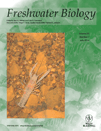
FRESHWATER BIOLOGY
Fostering Innovation in Aquatic ResearchFreshwater Biology is a premier academic journal dedicated to advancing the study of freshwater ecosystems and their biological diversity. Published by Wiley, this highly esteemed journal features an impact factor that reflects its influence within the field of aquatic science, maintaining a distinguished Q1 rank as per the 2023 standards. The journal is recognized for its comprehensive coverage of original research articles, review papers, and methodological advancements that address a range of topics from ecological interactions to conservation strategies in freshwater environments. With its extensive archive dating from 1971 to 2024, Freshwater Biology serves as an invaluable resource for researchers, professionals, and students looking to deepen their understanding of aquatic systems. Though it does not currently offer Open Access options, readers can access vital findings and contribute to the ongoing discourse in this critical area of study. Based in the United Kingdom, with its commitment to rigorous peer-review and high publication standards, Freshwater Biology continues to be a cornerstone publication in the field, enhancing our understanding of freshwater ecosystems and their management.

Water Biology and Security
Elevating research to protect our vital water ecosystems.Water Biology and Security, published by KEAI PUBLISHING LTD, is a pivotal open-access journal that has been addressing critical issues in the interdisciplinary fields of water sciences, aquatic biology, and environmental sustainability since its inception in 2022. With an E-ISSN of 2772-7351 and a distinguished ranking within the top quartile (Q1) of several categories including Agricultural and Biological Sciences, Animal Science and Zoology, Aquatic Science, and Water Science and Technology, the journal stands out as a leading platform for innovative research. Based in Beijing, China, and supported by an impressive impact factor derived from its Scopus rankings, the journal aims to disseminate high-quality and impactful research that addresses the challenges related to water resources and ecosystems. Its open-access format enhances accessibility, ensuring that vital information reaches policymakers, practitioners, and scholars worldwide. As we converge through 2024, the journal aspires to foster a vibrant scholarly community, facilitating dialogues that inform practice and advance the scientific understanding of aquatic environments.

LIMNOLOGY
Advancing Aquatic Science for a Sustainable FutureLIMNOLOGY, published by SPRINGER JAPAN KK, serves as a premier platform for the dissemination of high-quality research in the fields of aquatic science, ecology, and water science and technology. With an ISSN of 1439-8621 and an E-ISSN of 1439-863X, this respected journal has consistently maintained a Q2 ranking in its respective categories as of 2023, reflecting its impact and relevance in the academic community. Operating from its base in Tokyo, Japan, LIMNOLOGY engages a diverse audience of researchers, professionals, and students who are focused on advancing knowledge related to freshwater systems and their ecological health. This journal covers a wide range of topics within its scope from the year 2000 to 2024, highlighting essential studies that contribute to both theoretical and applied aspects of limnology. Although this journal is not open access, its rigorous peer-reviewed articles are crucial for driving innovation and fostering dialogue among scientists and environmentalists dedicated to understanding and preserving water ecosystems.

INTERNATIONAL REVIEW OF HYDROBIOLOGY
Connecting Minds to Address Environmental ChallengesINTERNATIONAL REVIEW OF HYDROBIOLOGY is a prestigious academic journal dedicated to the dynamic fields of Aquatic Science and Ecology, Evolution, Behavior, and Systematics. Published by a reputable German publisher, this open-access journal ensures that groundbreaking research is readily available to a global audience, fostering collaboration and innovation within the scientific community. With an impressive impact factor and classification within the Q2 category of both Aquatic Science and Ecology, it ranks notably high on Scopus, standing at 211 out of 721 in Ecology and 84 out of 247 in Aquatic Science as of 2023. Covering a broad scope from fundamental hydrobiological research to applied ecological studies, the journal plays a crucial role in advancing knowledge and addressing contemporary environmental challenges. Researchers, professionals, and students will find INTERNATIONAL REVIEW OF HYDROBIOLOGY to be an essential resource for informing their own work and contributing to the global dialogue on aquatic systems and their conservation.

Aquatic Biology
Exploring the Depths of Aquatic ScienceAquatic Biology, published by INTER-RESEARCH, is a leading open-access journal dedicated to the scientific exploration of aquatic ecosystems, promoting innovative research in the fields of aquatic science, ecology, and oceanography since its inception in 2007. With an E-ISSN of 1864-7782, the journal publishes original articles, reviews, and data papers that contribute to the understanding of aquatic biology in its myriad forms. As of 2023, it holds a respectable Q3 ranking across multiple categories including Aquatic Science and Ecology, reflecting its sustained impact within the scientific community. Situated in Germany, Aquatic Biology operates a policy of open access since 2014, ensuring that valuable research findings are readily available to researchers, professionals, and students worldwide, thus fostering collaboration and knowledge dissemination. By addressing diverse aquatic topics, the journal plays a crucial role in advancing the study and conservation of marine and freshwater environments, making it an essential resource for anyone seeking to deepen their understanding of aquatic systems.
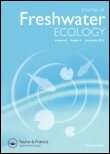
JOURNAL OF FRESHWATER ECOLOGY
Innovating research for sustainable freshwater futures.JOURNAL OF FRESHWATER ECOLOGY, published by Taylor & Francis Inc, is an esteemed source of research dedicated to advancing the understanding of freshwater ecosystems. Established in 1981, this Open Access journal has provided a platform for innovative studies and groundbreaking articles relevant to the fields of Aquatic Science and Ecology. With its HIndex reflecting a commitment to quality scholarship, the journal is currently classified in the Q3 category for both Aquatic Science and Ecology, Evolution, Behavior and Systematics, indicating its respectable impact within these disciplines. The journal ranks within the 45th percentile in Ecology and the 41st percentile in Aquatic Science on Scopus, highlighting its relevance to a global audience of researchers and practitioners. By facilitating unrestricted access to research findings since 2017, JOURNAL OF FRESHWATER ECOLOGY aims to enrich our understanding of freshwater systems and their conservation, making it an essential resource for those invested in ecological research and environmental sustainability.
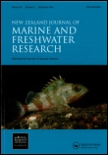
NEW ZEALAND JOURNAL OF MARINE AND FRESHWATER RESEARCH
Advancing Knowledge in Freshwater and Marine EcosystemsNEW ZEALAND JOURNAL OF MARINE AND FRESHWATER RESEARCH, published by Taylor & Francis Ltd, stands as a distinguished platform for the dissemination of innovative research in the realms of aquatic science and ecology. With an ISSN of 0028-8330 and E-ISSN 1175-8805, this journal has been curating significant scientific contributions since its inception in 1967, continuing through to 2024. Recognized in the Q2 category across multiple relevant fields—including Aquatic Science, Ecology, and Water Science—this journal ranks notably in Scopus, with a 74th percentile for Ecology, Evolution, Behavior and Systematics, highlighting its impact and relevance within the scientific community. Though not an open-access publication, its rigorous peer-reviewed articles offer insights that resonate with researchers, professionals, and students who are passionate about advancing our understanding of freshwater and marine ecosystems. By fostering a collaborative space for ecological and environmental inquiries, the NEW ZEALAND JOURNAL OF MARINE AND FRESHWATER RESEARCH is essential for those aiming to contribute to the vital conversations around biodiversity, conservation, and sustainable management of aquatic resources.
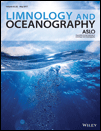
LIMNOLOGY AND OCEANOGRAPHY
Bridging the Gap Between Theory and Practice in Aquatic ScienceLimnology and Oceanography is a premier peer-reviewed journal published by Wiley that has been at the forefront of aquatic sciences since its inception in 1956. With an impressive impact factor placing it in Q1 in both Aquatic Science and Oceanography categories, this journal showcases cutting-edge research and studies relevant to the dynamics of freshwater and marine ecosystems. Limnology and Oceanography serves as a vital platform for researchers, professionals, and students to disseminate their findings and foster a deeper understanding of aquatic environments. The journal does not currently offer open access, but it provides a unique opportunity for scholars to contribute to a body of work that influences policy, conservation efforts, and the scientific community at large. With its substantial ranking in Scopus as #12 in Aquatic Science and #9 in Oceanography, Limnology and Oceanography remains a critical resource for advancing knowledge in these vital fields.
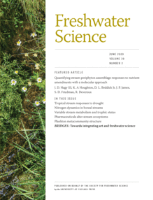
Freshwater Science
Exploring the Depths of Freshwater EcologyFreshwater Science is a pivotal journal published by the University of Chicago Press, dedicated to advancing the understanding of freshwater ecosystems and their biodiversity. With an ISSN of 2161-9549 and an E-ISSN of 2161-9565, this journal has been a vital resource in the fields of Aquatic Science and Ecology, consistently ranked in the Q2 quartile across multiple categories in 2023. The journal encapsulates rigorous research and innovative studies aimed at addressing the ecological dynamics of freshwater environments from 2012 to 2024. Researchers and practitioners benefit from its open access options, which enhance the dissemination of knowledge while contributing to a better understanding of aquatic systems. With Scopus rankings that place it in the top 30% of its fields, Freshwater Science plays an influential role in fostering scientific dialogue and collaboration among professionals, making it an essential publication for anyone invested in freshwater conservation, management, and ecological impact.